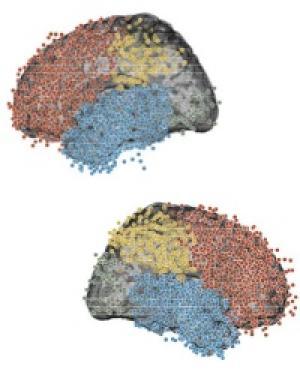据美国科学日报报道,几乎所有人都经历记忆连环触发的情景,但解释起来却很难。如今,宾夕法尼亚大学研究人员首次提供关于同一背景下记忆链接的神经生物学证据,情景记忆理论以此为基础。
艺术与科学学院(School of Arts and Sciences)心理学系教授 Michael Kahana 与其他研究人员共同开展这项研究,相关的研究结果发表在美国科学院学报上(Proceedings of the National Academy of Sciences)。
Kahana教授称,情景记忆理论表明,当想起一件事,我会检索同一情景下的早期记忆,把它链接在如今想到的事上。例如,想到祖母,我会回想到生活中不同时间、不同地点的各种关联情景;我也会想到在底特津生活和她的匈牙利当地的烹饪手法。这就如同心理在不同时间内穿梭,在时间上可以追溯过去,而此时此刻我却仍然待在原地。
宾夕法尼亚大学研究团队把数百年之久的心理学研究方法和精确的脑活动数据结合在一起,从而调查这一理论的神经生物学证据。心理学研究方法是让调查者记忆和回想一系列无关的词。
研究对象全是癫痫患者,他/她们脑中电极数处于50和150之间,尝试锁定引起癫痫发作的大脑特定区域。由于要等待癫痫自然发作,患者在植入电极的情况下生活好几个星期。
Kahana教授还说,我们可对猴子或老鼠作直接的脑记录,但用癫痫患者做实验,一些独特的记录可以获取。有了这些记录,我们可以把每毫秒出现的记忆与大脑的变化联系起来。
实验过程中,癫痫病人记忆每组不相关的15个词。依次看完一组词后,调查对象被一道简单的算术题分一下神,接着回想竟可能多的词,植入的电极会逐个检测他/她们的脑活动。为确保数据的可靠性,每一位调查对象要接受多次重复实验。
宾夕法尼亚大学医学院毕业生 Jeremy R. Manning称,通过电极记录大脑的活动模型,我们能监测大脑活动在什么时候与之前脑记录相同。当病人接触同一个词时,前后2次的脑活动保持一致。
这项研究可从大脑层面上解释人们日常经历的记忆现象。
Kahana教授称,这就是为什么不同时间、地点遇到的2个朋友能在你的记忆中联系在一起。沿着人生阅历的时间轴,每一个时刻都存在情景关联。不管时间跨度是几年还是几分钟,共同的情景经历都会联系在一起。
这一研究由美国国立精神卫生研究所和达纳基金会资助。(生物探索译 Pobee)

电极分布图
生物探索推荐英文原文
Neural Signature of 'Mental Time Travel': Memories Formed in the Same Context Become Linked, Evidence Shows
Almost everyone has experienced one memory triggering another, but explanations for that phenomenon have proved elusive. Now, University of Pennsylvania researchers have provided the first neurobiological evidence that memories formed in the same context become linked, the foundation of the theory of episodic memory.
The research was conducted by professor Michael Kahana of the Department of Psychology in the School of Arts and Sciences and graduate student Jeremy R. Manning, of the Neuroscience Graduate Group in Penn's Perelman School of Medicine. They collaborated with Gordon Baltuch and Brian Litt of the departments of Neurology and Psychology at the medical school and Sean M. Polyn of Vanderbilt University.
Their research was published in the journal Proceedings of the National Academy of Sciences.
"Theories of episodic memory suggest that when I remember an event, I retrieve its earlier context and make it part of my present context," Kahana said. "When I remember my grandmother, for example, I pull back all sorts of associations of a different time and place in my life; I'm also remembering living in Detroit and her Hungarian cooking. It's like mental time travel. I jump back in time to the past, but I'm still grounded in the present."
To investigate the neurobiological evidence for this theory, the Penn team combined a centuries-old psychological research technique -- having subjects memorize and recall a list of unrelated words -- with precise brain activity data that can only be acquired via neurosurgery.
The study's participants were all epilepsy patients who had between 50 and 150 electrodes implanted throughout their brains. This was in an effort to pinpoint the region of the brain where their seizures originated. Because doctors had to wait for seizures to naturally occur in order to study them, the patients lived with the implanted electrodes for a period of weeks.
"We can do direct brain recordings in monkeys or rats, but with humans one can only obtain these recordings when neurosurgical patients, who require implanted electrodes for seizure mapping, volunteer to participate in memory experiments," Kahana said. "With these recordings, we can relate what happens in the memory experiment on a millisecond-by-millisecond basis to what's changing in the brain."
The memory experiment consisted of patients memorizing lists of 15 unrelated words. After seeing a list of the words in sequence, the subjects were distracted by doing simple arithmetic problems. They were then asked to recall as many words as they could in any order. Their implanted electrodes measured their brain activity at each step, and each subject read and recalled dozens of lists to ensure reliable data.
"By examining the patterns of brain activity recorded from the implanted electrodes," Manning said, "we can measure when the brain's activity is similar to a previously recorded pattern. When a patient recalls a word, their brain activity is similar to when they studied the same word. In addition, the patterns at recall contained traces of other words that were studied prior to the recalled word."
"What seems to be happening is that when patients recall a word, they bring back not only the thoughts associated with the word itself but also remnants of thoughts associated with other words they studied nearby in time," he said.
The findings provide a brain-based explanation of a memory phenomenon that people experience every day.
"This is why two friends you met at different points in your life can become linked in your memory," Kahana said. "Along your autobiographical timeline, contextual associations will exist at every time scale, from experiences that take place over the course of years to experiences that take place over the course of minutes, like studying words on a list."
The research was supported by the National Institutes of Mental Health and the Dana Foundation.







